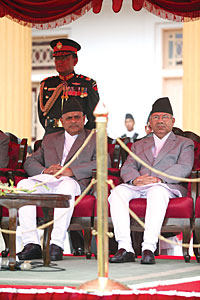 KIRAN PANDAY |
Late in his life, political scientist Samuel P Huntington gained notoriety for two of his most controversial works: Clash of Civilizations (1996) and Who Are We? The Challenges to America's National Identity (2004). In the post-9/11 world, the Clash of Civilizations was cited as being prophetic. Actually it was a prescriptive work for a new world order in the post-Cold War era with the United States as the only global power. In somewhat similar vein, the book on America's national identity is an apologia for America's increasingly illiberal immigration policies.
Huntington's lasting contributions to political discourse are contained in two of his earlier works-The Soldier and the State: The Theory and Politics of Civil-Military Relations (1957) and POCS, first published in 1968. Of the two, the later volume is particularly relevant to appreciate the contradictions of Nepali politics and understand its dark forebodings.
Wedged between an assertive military and duplicitous militants, mainstream politicians have little room to manoeuvre to establish peace and democracy in the country.
Huntington was a 'conformist-reformer' policy analyst. Though a lifelong democrat, his prescriptions were invariably on the side of caution when not outright conservative. The Harvard academic preferred order to liberty because, 'Men may, of course, have order without liberty, but they cannot have liberty without order.'
This is the theme that his student Fareed Zakaria later updated in a tract called The Future of Freedom: Illiberal Democracy at Home and Abroad. As Francis Fukuyama notes in a very succinct foreword of the new edition of POCS, Huntington laid the groundwork for a development strategy that came to be called 'authoritarian transition' in which a modernising dictatorship provides, 'political order, rule of law, and conditions for successful economic and social development. Once these building blocks were in place, other aspects of modernity, like democracy and civic participation could be added.'
From Burma to Pakistan, the Huntington Hypothesis has failed to stand, but it seems to fascinate a section of the Kathmandu ruling class. Huntington thinks that a proclivity for authoritarian transition is the defining characteristic of praetorian societies. Praetorianism is a form of militarism in which the armed forces act as a corporate body to maintain control over government, actively intervening in politics to select or change the government. When social forces confront each other directly and institutional arrangements of conflict resolution are absent, security forces acquire legitimacy by default to step into the arena of civic governance. Nepal seems to be headed in the direction of Huntingtonian praetorianism.
A non-elected member of the CA who entered the legislature by the backdoor has been installed as prime minister. His stature within his own party is not prominent: Comrade Nepal is neither party chairperson nor the parliamentary party leader of UML. The legality of the prime minister's position is unassailable, but he lacks the moral authority to have his way in the 22-party coalition of almost all anti-Maoist forces.
For CoAS Rookmangud Katawal, President Ram Baran Yadav is the boss. When Comrade Nepal disagrees with that assessment, the premier would be free to follow in the footsteps of his illustrious predecessor and bow out with grace.
The collapse of governance seems to cry out for adventurous interventions. Fear-induced paralysis of the Pahadi community in central and eastern Tarai, the political and economic heartland of Nepal, has become so alarming that any weak government will be tempted to mobilise the security forces to fight armed bandits. The problem with such a solution lies with the composition of Nepal's army and police: they aren't inclusive enough to reassure Madhesis of their true intentions. The Maoists may tacitly support military activism to undermine the credibility of state forces, but they too would ultimately be its victims when the country becomes too chaotic and outsiders invite themselves to restore order.
The antidote to praetorian experiments is the revival of consensus politics, but the two communist parties seem to be poles apart. Communists are said to be avid readers. They should grab a copy of POCS and read it before going for any confrontational politics.



